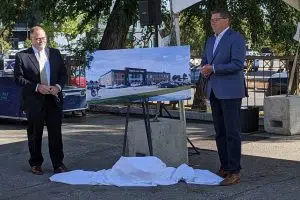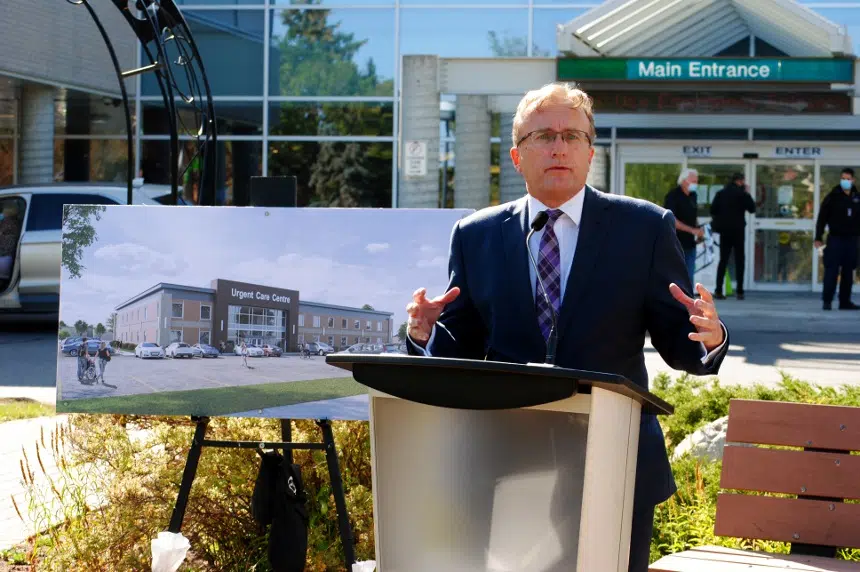Many of the details still have to be worked out, but Health Minister Jim Reiter stood in front of Regina’s Pasqua Hospital on Monday morning to announce $30 million for two urgent care centres to be built in Regina and Saskatoon.
They’ll be the first such centres in the province. Reiter said they are meant to help alleviate some of the pressure on emergency rooms by taking patients who have problems that need to be dealt with right away, but that won’t necessarily kill them.
“If you cut yourself and you need stitches or if you break a bone and you need a cast, it’s not life-threatening but you certainly can’t wait until tomorrow to go to your doctor’s office and they don’t even provide some of those services,” said Reiter.
Province announcing $15M each for an urgent care centre in Regina and Saskatoon. Says it will help ER wait times by taking ppl who need care right away but it's not life-threatening (like stitches) pic.twitter.com/FL8UUxwkSt
— Lisa Schick (@LMSchickler) September 21, 2020
The centres will operate 24 hours, seven days a week and will provide things like stitches and casts, as well as treatment for infections, rashes, flu symptoms and asthma. There will be on-site diagnostic imaging, pharmacy and lab services.
There will also be help for mental health and addictions needs as well.
In Saskatoon, Premier Scott Moe said the new centres will provide an important alternative to facilities already in place throughout the two cities.
“The goal is to get people into the appropriate medical care sooner; that’s what today’s investment is about,” Moe said. “We felt this was a priority.
“This will provide a greater continuing of care for people who may suffer from addictions or mental health challenges.”
Colleen Quinlan is the executive director of mental health and addictions services for the Saskatchewan Health Authority for Regina and Saskatoon. She said the centres will provide assessments and short-term interventions for people in a crisis or at risk of rapid deterioration into a crisis.
However, things like suicidal or homicidal tendencies will still be treated in emergency rooms.
“This is an important part of our plan to increase access to urgent mental health and addictions care in Saskatchewan,” said Quinlan.
Reiter said the mental health and addictions component isn’t a direct response to the situation that occurred with Samwel Uko, a man who was in the midst of a mental health crisis but was turned away from the ER at Regina’s General Hospital. He ultimately took his own life.
“I think this just speaks to … the fact that we just need more mental health and addictions services in Regina and Saskatoon and the rest of the province,” said Reiter.
Construction is hoped to start in 2022, but there isn’t a location set yet for the facilities in either city.
Reiter said site assessments are ongoing and officials hope to have a decision made this fall.
“When you build something like this, there’s all kinds of issues they need to look at — proximity, what properties are available, what would best suit — so they’re doing their due diligence on that right now,” said Reiter.
Other details like how many patients the facilities will hold are still being worked out as well.
When asked why the announcements were made when such details still haven’t been worked out, Reiter said the government is going into a writ period soon for the election when such business will stop, so he thought it was important for people to know where the province’s stimulus funding will be going.
The $30 million is coming from the $7.5-billion fund the provincial government earmarked for capital projects to help stimulate the economy under the COVID-19 pandemic.

SHA CEO Scott Livingstone (left) and Premier Scott Moe unveil an artist’s rendering of the new urgent care centre in Saskatoon on Sept. 21, 2020. (Logan Stein/650 CKOM)
“We are still working through what type of services will all be available. We will figure out what kind of staffing we will need. This will be another tool in our toolbox that will help us care for people in our communities,” SHA CEO Scott Livingstone said in Saskatoon.
“We don’t have all the answers right now, but we believe this will be an important step for improving mental health and addiction services throughout the province.”
— With files from 650 CKOM’s Logan Stein











